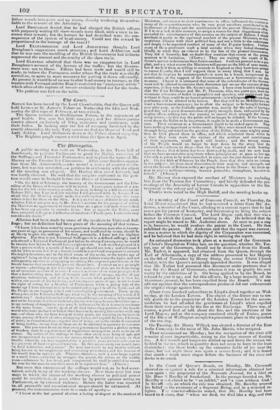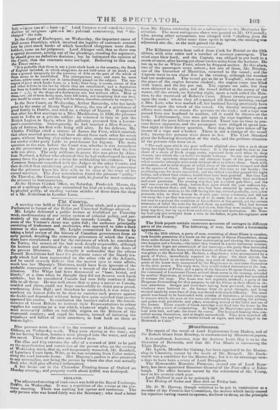In the Court of Queen's Bench, on Monday, Mr. Cresswell
showed ca Ise against a rule for a criminal information obtained last term again t the proprietor of the Newcastle Journal, for a libel on Mr. Russ ll Bowlby of Sunderland. In the passage founded on, Mr. Bowlby w .s declared to be "an infidel," and "a mutt without God." In his affi 'avit, on which the rule was obtained, Mr. Bowlby avowed his belief ill the existence of a Supreme Being, and in a revealed re- ligion. Tao coubter-affidavits stated, that Mr. Bowlby bad been heard to d:elare, that " when we died, we died like a dog, and that
holy religion was all a humU g.". Lord Denman cued loped the intro- duction of religious opinions int, political controversy, but " dis. charged " the rule. In the Court of Exchequer, on Wednesday, the important cause of Ball versus Franklyn, which involved the legality of contracts entered into by joint stock banks of which beneficed clergymen were share- holders, carne on for judgment. Lord Abinger said, that as there was a special demurrer, arising out of the pleadings, standing for argument, he should give no definitive decision ; but he intimated the opinion of she Court, that the contracts were not legal. Referring to this case, the Times says- " It is probable that there is not a joint stock bank in the country, the Bank of England included, in which clergymen do not hold some of its stock; and thus a general incapacity for the recovery of debt on the part of the whole of them seems to be established. The consequences may, and must be, most serious, unless some new law is immediately passed on the subject. The ms. masers of joint stock banks have, as a body, been long, it seems, aware of this and other defects in the law by which they are constituted ; and a deputation has been in London for some weeks endeavouring to move Mr. Spring Rice to sores k,ly, in the shape of a declaratory act, but without effect. Most of them,' s snd of term being near, have left town, not imagining that any deci. 'ion would be come to; and they will be taken, therefore, entirely by surprise."
In the New Court, on Wednesday, Arthur Battersby, who has lately gone by the name of Henry Napier Disney, the son of a gentleman of good family in Dublin, was tried on a charge of bigamy. It appeared that after his first marriage to a Miss Muckleston, in 18:26, the prisoner went to India as a private soldier; he returned in time to join the British Legion in Spain, when his gallantry procured him a Lieute- nant's commission. Subsequently, he had married a Miss Stoehr, a lady of fortune, his first wife being still alive. In his defence, Mr. Charles Phillips cited a statute of James the First, which enacted, that when married persons had been absent from each other for seven years, without bearing that either were alive, another marriage would
not render either party liable to punishment for bigamy. The main
question in the case before the Court was, whether it was incumbent on the prosecutor to prove that the prisoner was aware that his first
wife was alive. The only evidence to prove this was given by Abra- ham Ne.wland, a fellow who admitted that he had endeavoured to extort money from the prisoner as a bribe for withholding his evidence. The Common Sergeant consulted with the Judges in the other Courts, and then decided that satisfactory proof should be given by the prosecutor that the prisoner knew his first wife to be alive at the time of his second marriage. The Jury nevertheless found the prisoner " guilty." On Thursday, the Common Sergeant said, he feared he must sentence the prisoner to transportaion. At the Hatton Garden Office, on Saturday, Frederick Mason, the son of a military officer, was committed for trial on a charge, to which be pleaded guilty, of stealing various articles of dress from the shop of a Mr. Jenkinson in Leather Lane.



























 Previous page
Previous page